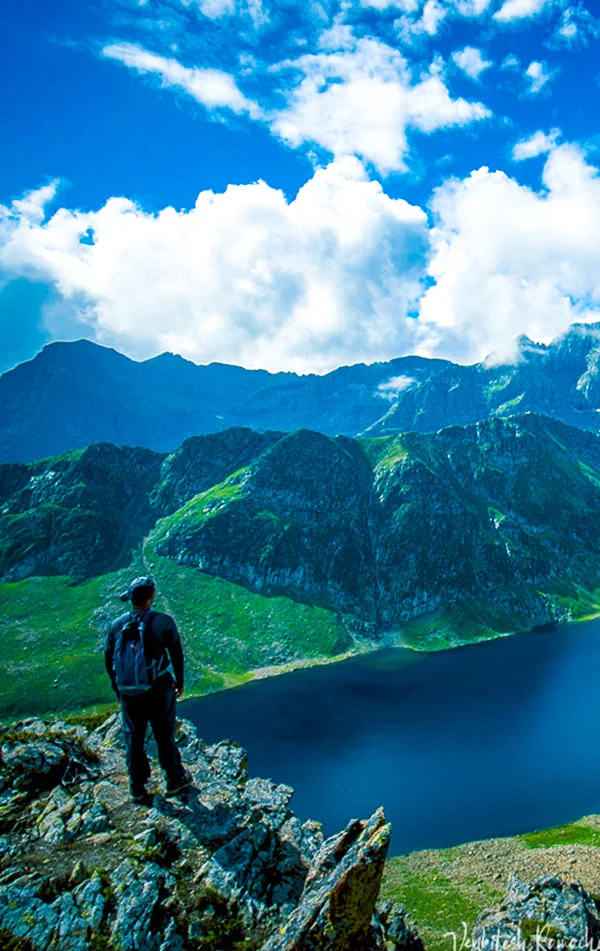
Region
Jammu and Kashmir | India
Duration
7 Days
Max Altitude
13500 Ft.
Trekking Km
48 KM
Grade
Easy to Moderate
Help & Support
+91 7302321133 info@trekthehimalayas.com10:00 hrs to 18:00 hrs | GMT +5:30
Monday - Saturday | Sunday Closed
14900 /Person
- July-2024
- August-2024
- September-2024
- +5% GST (goods and services tax)
- Services Srinagar to Srinagar
- Addons
-
Insurance is Mandatory.
-
Non-Indian rates are slightly higher. Trek coordinator will provide balance payment link post-booking.
- Get insurance through us or elsewhere. If not through us, email for a refund after booking.
-
Cancellation 4 or more days before the start of the trip results in a 100% cash refund.
-
Cancellation less than 4 days from the start of the trip results in no refund.
-
Transportation Srinagar to Aru & retun is optional
-
Choose add-ons during booking. If missed, log in and add them later
-
Book transportation at least 10 days before the trek.
-
Cancellation 4 or more days before the start of the trip results in a 100% cash refund.
-
Cancellation less than 4 days from the start of the trip results in a 50% cash refund.
-
Cancellation after the trip date does not qualify for a refund.
-
Backpack offload is optional
-
Choose add-ons during booking. If missed, log in and add them later.
-
Book off-load at least 10 days before the trek.
-
For offline bookings at the base camp, a convenience fee of Rs. 2000 applies.
-
Cancellations made before the trip date will receive a full refund.
Insurance 245
Transport 1600
Offload 1800
For more information. Please complete this form.
Help & Support
+91 991 772 4737info@trekthehimalayas.com 10:00 hrs to 18:00 hrs | GMT +5:30
Monday - Saturday | Sunday Closed
Overview
Trek Name: Tarsar Marsar Trek
Days: 7
Adventure Type: Trekking
Base Camp: Aru
Season:Monsoon | Autumn |
Month:July | August | September | October | November |
Country: India
Altitude: 13500 Ft.
Grade: Easy to Moderate
Rail Head: Jammu
Stay: Camping (Twin sharing) & Hotel/Guesthouse
Food: Meals while on trek & at Hotel/Guesthouse (Veg & Eggs)
Location: Jammu and Kashmir
Distance: 48 Km.
Trail Type: One way trail | Camping in various locations, starting and ending at the different point.
AirPort: Srinagar (sheikh ul-alam international)
Highlights:
- +5% GST (goods and services tax)
- Services Srinagar to Srinagar
One day, if you wake up in the meadows of Kashmir on your trek to Tarsar Marsar, that moment, your entire life is going to dissolve into a distant dream. As though you have just crossed the threshold and come to heaven. The famous couplet of the Persian poet shall ring true— if there is a paradise on earth, it is here, it is here, it is here!
The valley of Kashmir is an experience that may rob the most masterful wordsmith of adjectives, but never fail to brew unceasing lyricism in the heart of her beholders. Kashmir’s inherent classical romanticism aside, there are some things exclusively special to trekking and the Tarsar Marsar twin lakes trek brings all of them together.
Grasslands like velvet, walking through hovering pine trees that are beautiful and fragrant, little thatched roofed hamlets peopled by beautiful humans, the perfect stillness of azure waters, and camping by the glacial lakes which give the trek its name. What’s more wonderful, on practical trekking terms, Tarsar Marsar doesn’t charge a great deal of physical challenge, acclimatization prerequisites, or exhaustion.
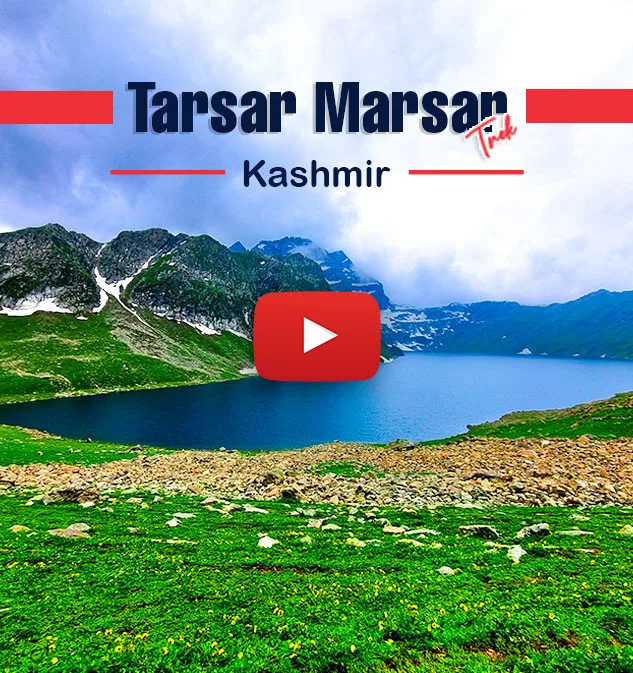
Who Can Participate
-
Age; 12 years +.
-
First timers can apply; previous trekking experience is more appreciated.
-
The climber must be fit and have sufficient stamina to cover 5 km of distance in 30 minutes without stress.
-
The climber should be able to carry a 10-15 kg backpack.
-
Pulse rate at rest must be in between (60 to 90 beats per minute)
-
Blood Pressure Reading must be in between (DIASTOLIC 70 – 90, SYSTOLIC 100 - 140 mm Hg)
-
Respiratory rate at rest must be in between (12 to 20 breaths per minute)
-
Should not have Liver and kidney issues
-
Should not have Diabetes Mellitus, Bronchial Asthma, Heart problems, Hypertension etc
-
No pacemaker implant
-
People with the Sinus issues, Epilepsy please contact to trek coordinator before booking the trek
-
If your BMI is not normal, Please contact our Trek coordinator before Trek booking.
Medical & Disclaimer Form (Mandatory Documents) Click here to download Medical & Disclaimer Form
- Government Employees can avail the benefit of Special Casual Leave (SCL) when you join us for a trekking expedition. As per the rules of the Pay Commission, Special Casual Leave can be availed for up to 30 days in a calendar year for trekking/mountaineering expeditions through a registered organization. Trek The Himalayas is a registered adventure tour operator by Indian Mountaineering Foundation (IMF) and Ministry Of Tourism (MOT)
- Trekkers have to apply for leave at least 20 days before trek departure date,
- This service is exclusive to Indian government employees and is applicable only for treks within India.
- Do mail at info@trekthehimalayas to apply and mention your booked trek date and trek name.
- Junior trekkers (below 15 years) should have a company of parents/guardians.
- Trekkers between 15 to 18 years can come solo with the disclaimer form signed by parent/guardian.
- Medical & Disclaimer Form (Mandatory Documents) Click here to download Medical & Disclaimer Form
Itinerary
Srinagar To Aru Base Camp
Our first-day destination is Aru on the banks of Lidder and Aru Rivers, situated 12 km off Pahalgam. A fairly developed tourist stop, Aru is regarded as the main base for two well-loved treks - the Tarsar Marsar and Kolahoi Glacier Trek, the destination of the latter being the origin of the Lidder-Aru Rivers.
Our representatives will meet you in Srinagar and from there you will take a short 3 to 4 hrs drive to Aru via Pahalgam. From Pahalgam, two routes go towards Aru, one through the village of Anantnag and one through Bijbhera. Bhijbera route is a tourist trail that presents the beautiful rural scenery of Kashmir with apple orchards, apricot, and walnut trees. Since a steady telephonic network cannot be confirmed at Aru, you need to wrap up your communication at Pahalgam itself. At Aru, you will be welcomed at a riverside camping zone, off the touristy hub, by the sweet-flowing Lidder. There are lots of activities around the town at Aru– from trout fishing in Lidder, and the Aru Biosphere Reserve to horseback riding and heliskiing in winter. You can explore and mark these for a later visit because we will be reaching quite late into the dusk around 6 pm.
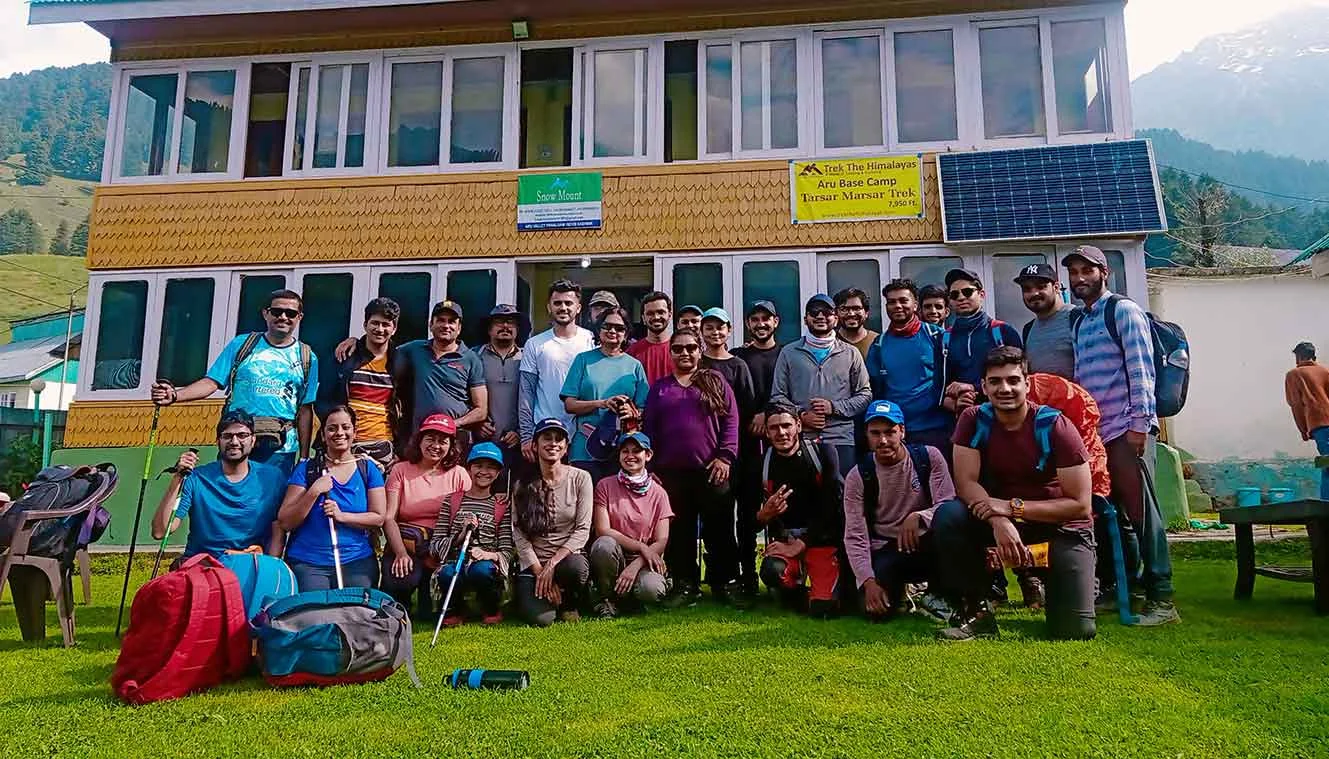
Aru To Lidderwat
Today we will be following the Lidder River upstream. The trail starts right out of the village and follows the course of the river. It is a long but gentle climb to Lidderwat. After about 9 to 10 km the trail moves up soft slopes, entering a thicket of conifers, revealing a sweeping view of the Aru Valley down below on the left side. We continue venturing through the forest shade before we arrive at a clearing filled with Gujjar huts. This is the Nandekai Village, inhabited by seasonal, migrating shepherd people, and agrarian, foraging Gujjar community. Here is a slice of idyll, picture-perfect, and a far call from life as we know it. We won’t be crossing through the heart of the village but rather get a priceless bird’s eye view of the picturesque setting as we move uphill. A little after we enter a tumbling meadow as the fir tree thickets completely ebbs away. This is still part of the Gujjar Village ecosystem and you are going to find horse-riding folks and cattle grazers.
The trail cuts across a couple of valley streams next as we go. We soon come across a crude log bridge over the second brook. The streams are very clear and it is safe to drink the water in the stream. This is the spot to refill our water and take some rest, maybe have the packed lunch carried from the last campsite. The Lidderwat locale is still an hour’s journey from here.
The trail here curves into another wooded area of gorgeous firs before coming out into the meadows of Lidderwat, where the river flows clear watered. We can find quaint little Gujjar settlements that mark the very locale. Thanks to tourist inflow in recent times, there are also Pahalgam District Authority Huts and food places established for comfortable stays. There are enough places to pitch camps in this section of the trail.
Our camp would be at a quiet spot close to the stream which is nothing short of a dream. There should be enough time before sundown to walk around the peaceful fir tree-shaded Gujjar settlement and explore the meadows, and then lay out in the dying light on soft grass by the streamside to soak in the tranquillity.
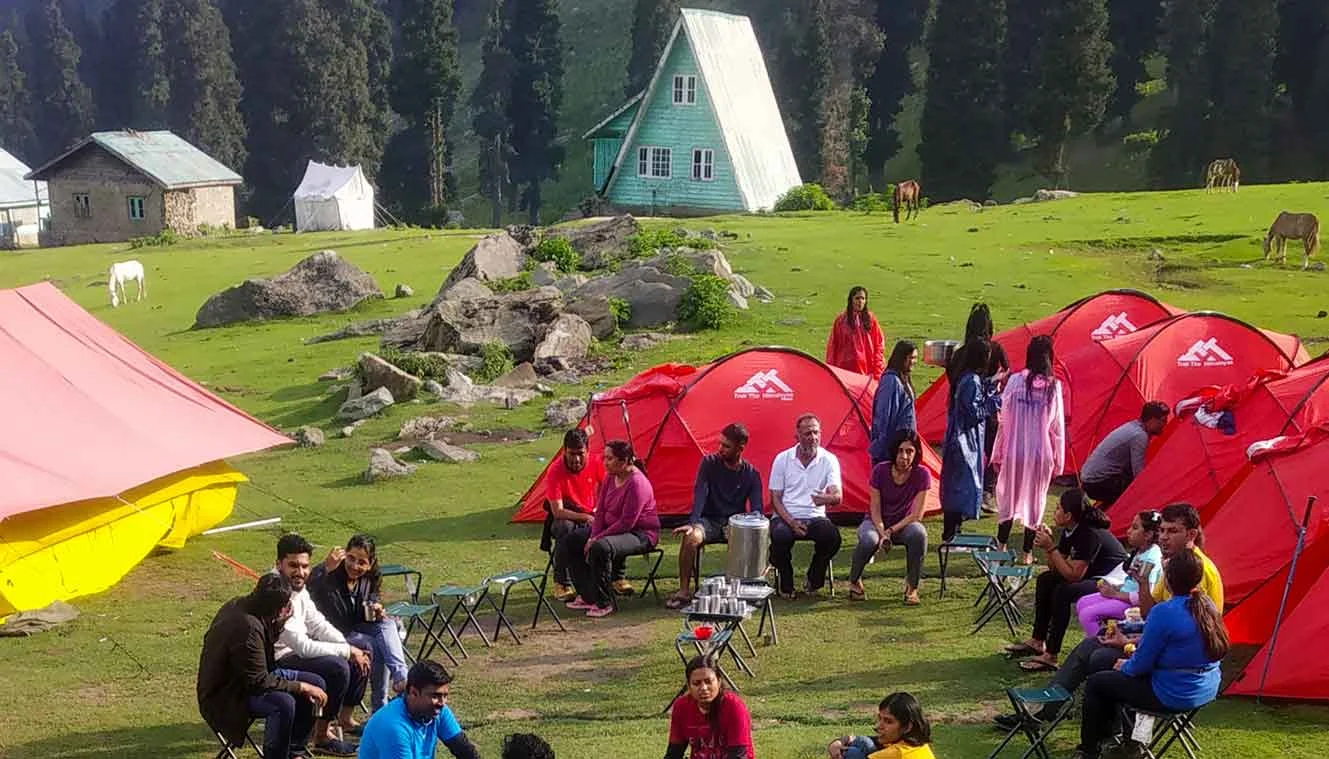
Lidderwat To Shekwas
Today we trek approx 5 hours along a trail winding up directly from behind the PDA homes. The trail starts alongside the Lidder River and in a matter of half an hour you will find yourself inside a forest of pines, the Lidder River is now a distant shadow and the meadows have ebbed away. The woods are not very thick and occasionally open up to wide clearings.
Soon, you will find the stretch of Lidderwat coalescing with a more vast expanse of merging valleys and snow-covered peaks rising straight from the base of the valleys. The grasslands now merge such that it is no longer a single valley but a convergence of many valleys together. There will be multiple clear water streams cutting across our path where you can stop to refill your water bottles.
We will now be heading towards Homwas, which is a little clearing inhabited by a cluster of Gujjar huts and it falls on the other side of the river. After crossing a log bridge, we are ushered into a locality with a few homes and tea shops. You will never fail to find warm hospitality with these villagers and despite the exhaustion of the travels, this makes one’s day.
Crossing the village, you will walk parallel to the crystal river before you enter a different grassy landscape. The walk from Homwas to Shekwas is a delight as you mostly walk on the soft grass. Soon you will arrive at Shekwas. The trail now follows in a south-westerly direction and enters a narrow valley where a beautiful river constantly keeps you company. You will keep gaining altitude and in an hour, you will enter a cluster of Bhoj trees that unfolds into a green scenery stretching in gentle folds to as long as the eyes can see, the meadows of Shekwas are breathtaking. Gujjar habitation and hospitality are ubiquitous in this area too and their little low-roofed, leaf-thatched huts dot the lush landscape here and there. Our trail climbs past the huts onto a slightly higher camping ground. A sweet night, a star-studded night falls over the meadows.
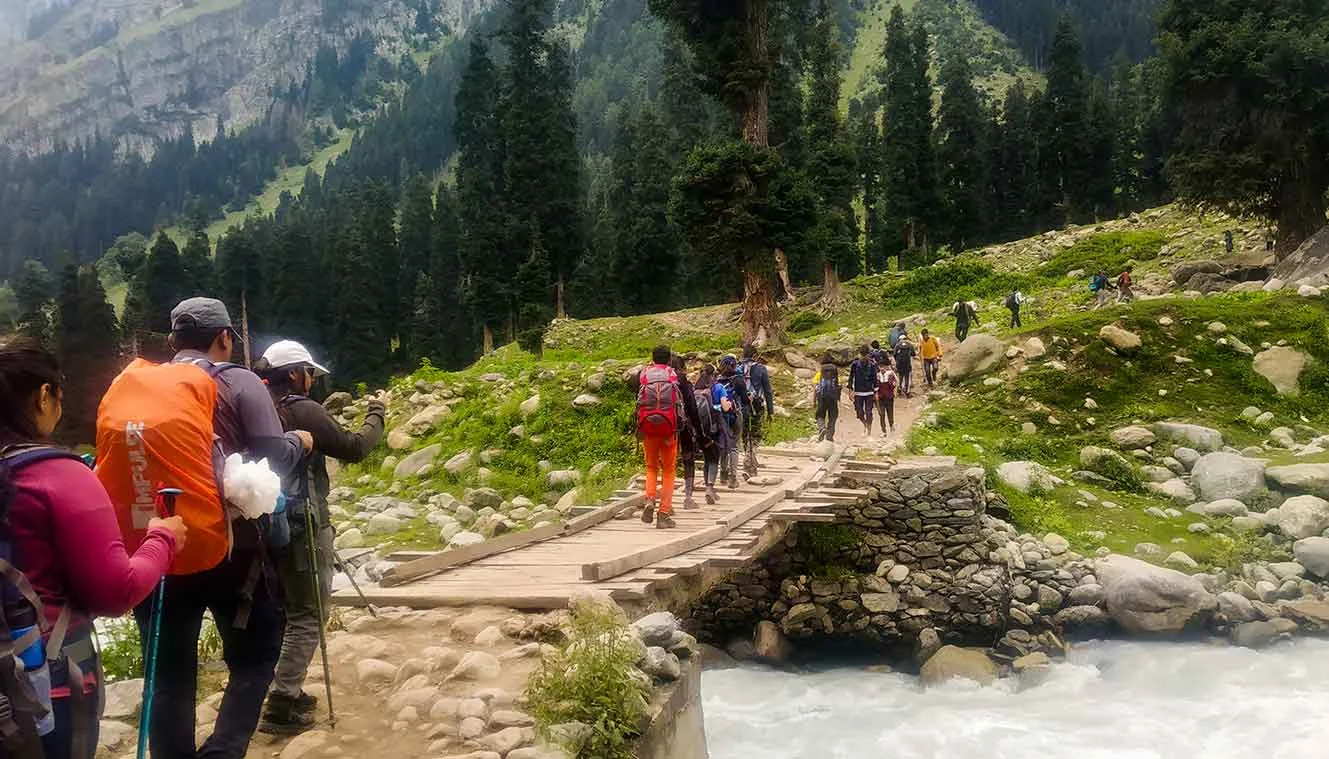
Shekwas To Tarsar And Explore Tarsar
From Shekwas, the trail entwines along a grassy landscape for a while. The green moors of Shekwas are best experienced with bare feet. Try this as you set out of Tarsar Lake today. The agenda today is the trek to the first lake, Tarsar. The trail moves through a silken lawn of nature for some time before climbing over a humpbacked hill and after crossing a few ridges you get a little peek of Tarsar’s magnetic blue waters. You will follow a westward direction in general.
It takes a total of 5 hours to reach Tarsar from Shekwas, the view of the lake widening as we go down succeeding smaller ridges. Every ridge on the trail opens to a stupendous view. The views of the snow-clad peaks become grander as we get closer to the lake. You need to cross the stream, jumping from boulder to boulder adventurously before finally gliding into a verdant meadow around the lake where we will camp at night. Sink your feet deep into the soft grass and watch how the lake water reflects the passing hues of the sky as the day rolls on. Time seems to come to a standstill amid such beauty and silence. There are plenty of flat open spots by the lake where you can pitch your tent. Remember that the entire trek takes place along an eco-friendly zone so please do not litter around the lake or anywhere along your trek and encourage others to not do the same.
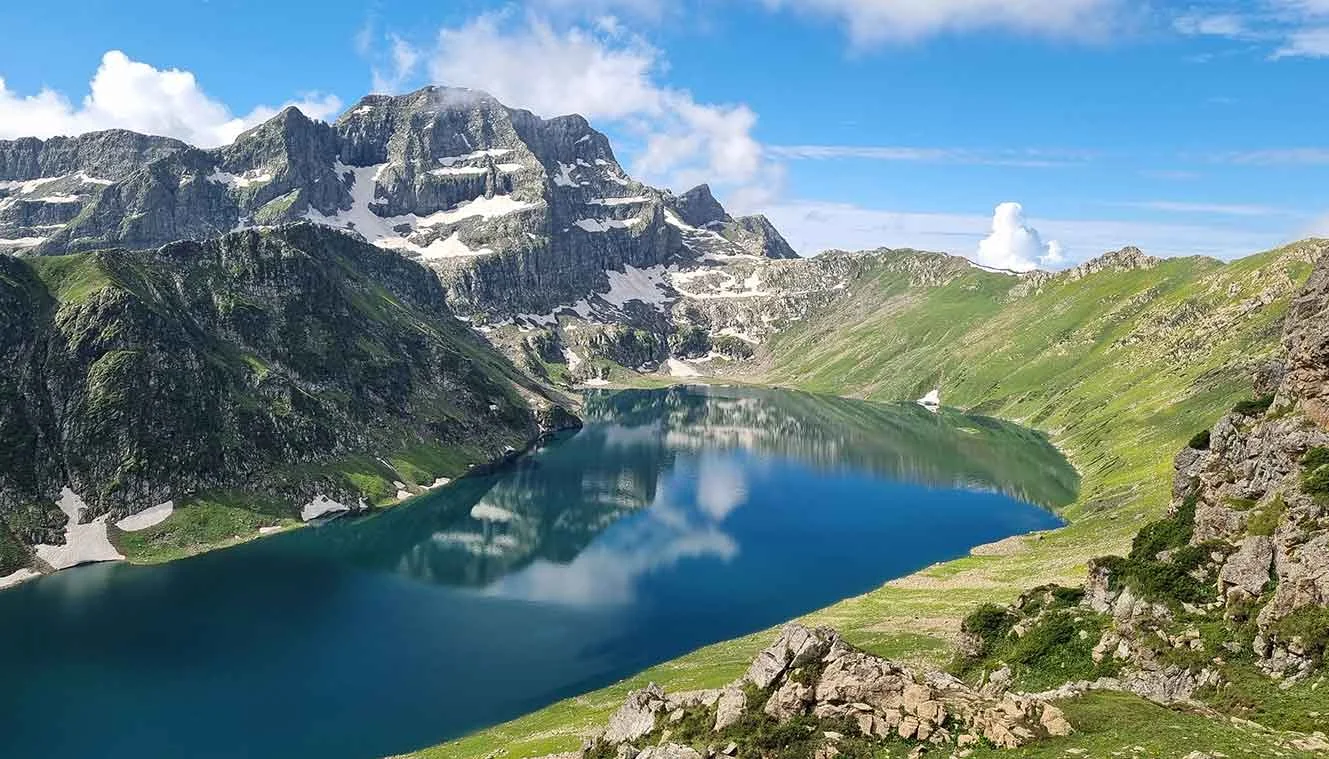
Tarsar To Sundarsar
Today we will trek another 5 km to the adjoining Sundarsar Valley through Tarsar Pass. We delve into a connecting stretch first which joins the meadows of Shekwas and Sundersar Valley. Trekking through the Tarsar Pass is actually a time-saving but comparatively more hectic plan than descending to Shekwas first and heading to Sundarsar from there, although some trekkers do a trek down from Tarsar to Shekwas and then turn left to enter Sundersar. Climbing the pass saves about 3 to 4 hrs of the trek. The Tarsar Pass presents beautiful views of the valley that spans out so beautifully. Descend from the pass via the shepherd’s trail and a couple of minutes later, you can spot a few Bakkarval shelters on the left side. From behind the shelter, the trail climbs up to a knoll. Past the knoll is the view of a lush meadow of such astounding beauty that it would inspire poets to emote poetry. Sheep and horses graze on the pastures unmindful of your presence. These are one of the most beautiful meadows with a large pond in the middle and in the backdrop, the snow-covered mountains enhance the scenery. You have to cross a ridge top and climb down to reach the green landscapes of Sundarsar.
You can actually test your stamina on this day’s trek after so many days of walking on gentle undulations. On the ascent to the pass, the trail gets steeper but then mellows down to a gentler slope to Sundarsar. The highlight of the stretch comes with a view of Tarsar Lake from the other side of the Pass. The lakeside offers a perfect camping spot to set up your tents for the night.
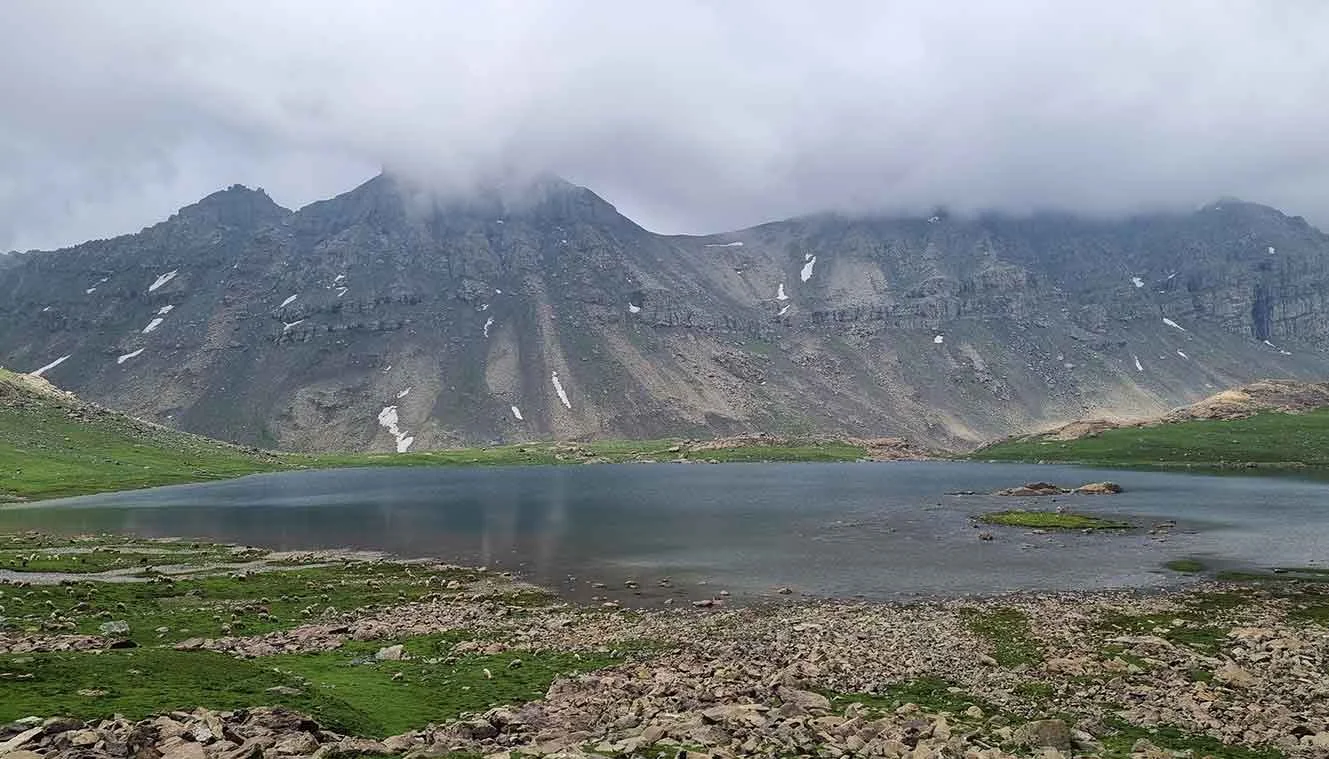
Visit Marsar And Then Homwas
Today we will ascend higher up through Marsar Ridge. Kilting our way around Sundarsar shores, we will be directed to a boulder-smitten path. There are two passes from Sundarsar that will take you to Marsar Lake. The boulder-laden route that we take is the quicker one. You can expect slippery snow patched in these rock crevasses, just like the white-covered mountains at the end of the valley that we witnessed through our trek in the last few days. At midday, the snow will melt and it’s going to be a tricky walk. Trekking poles and ice axe can be quite a blessing here.
After covering a partly grass-covered, partly snow-sheeted rock trail over the pass, we slightly descend to a flatland that’s cut through by occasional water flows. Keep to the trail on the left and you will spot a ridge that climbs from your left and to the front. The pass a beautiful stretch of green that leads to flatter grounds and after crossing the grassy stretch and hopping over some brooks, you will spot another ridge on your left. The top of the ridge view reveals the translucent blue Marsar Lake lying somewhere down below. It has the same kind of almond-shaped outline as Tarsar and is almost as big. Snow-covered mountains line along the edge of the lake, offsetting its blueness. The lake happens to overflow on one side and go down in a sweeping glacial stream down to a valley below. The snow melts from the white cliffs and feeds its waters on one side and on another side, the Dachigam forest starts. The forest reserve climbs almost up to the lake shores. After spending some time at Marsar Lake we will get back to Sundarsar.
We descend back to Sundarsar camps and then to Homwas, trailing almost along the same way that we came by. It takes about 40 minutes of a downhill climb to reach Sundarsar. The descent is full of nostalgia as you relive your experience on the trail once more. Homwas is reached before nightfall, slightly exhausted.
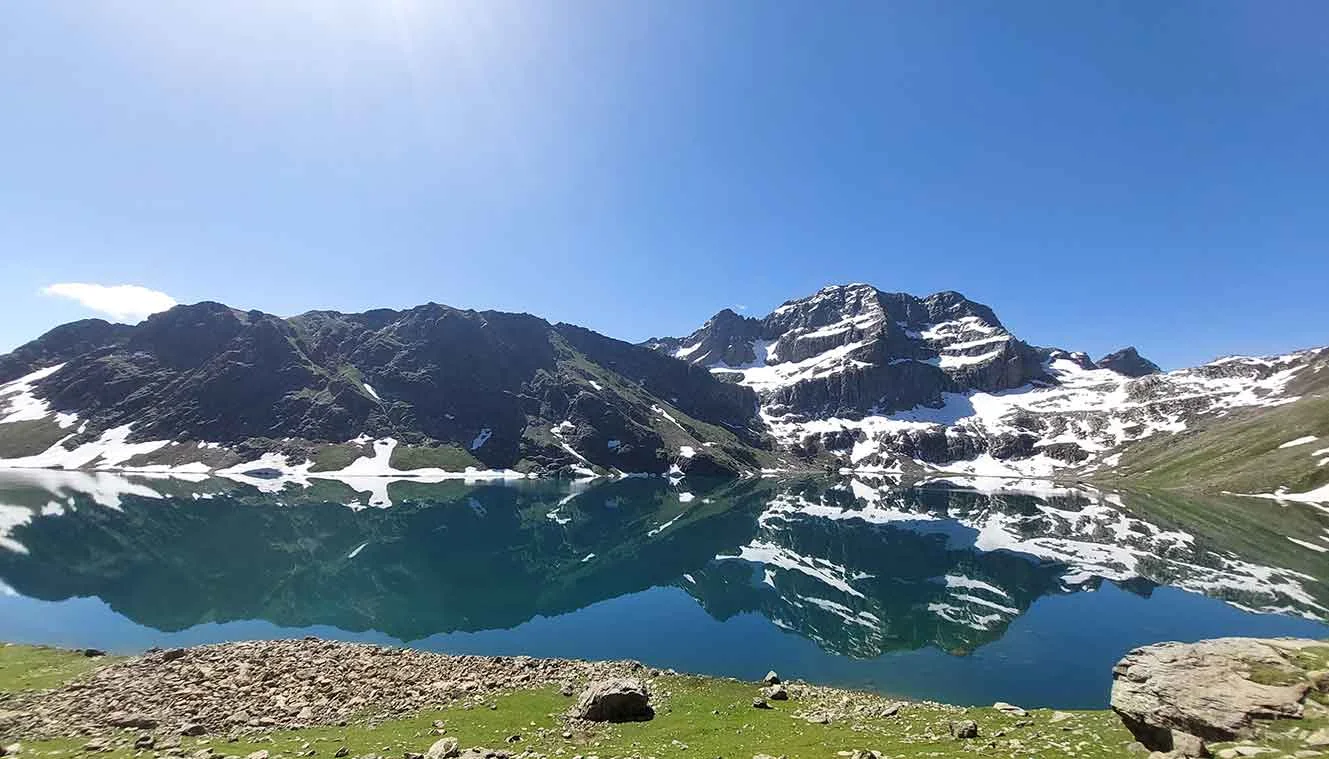
Homwas To Aru And Drive Srinagar
Starting off early morning today, we descend from Homwas to Aru, sweeping over the same enchanting meadowlands we had experienced on the first days, and the same Lidder River, now to be followed downstream. Descending through this trail will give you some sights that you missed previously when climbing up. This includes the views of the shrinking Kolahoi glacier and the pine forests of Lidderwat from a whole new perspective.
We will stop at Lidderwat to rest and have lunch and then set off again, now towards Aru, 10 km from Lidderwat. It takes about 4 hours approx. to cover the distance.
Srinagar-bound vehicles shall be waiting for us at Aru. We can expect to reach the station within 8 at night.
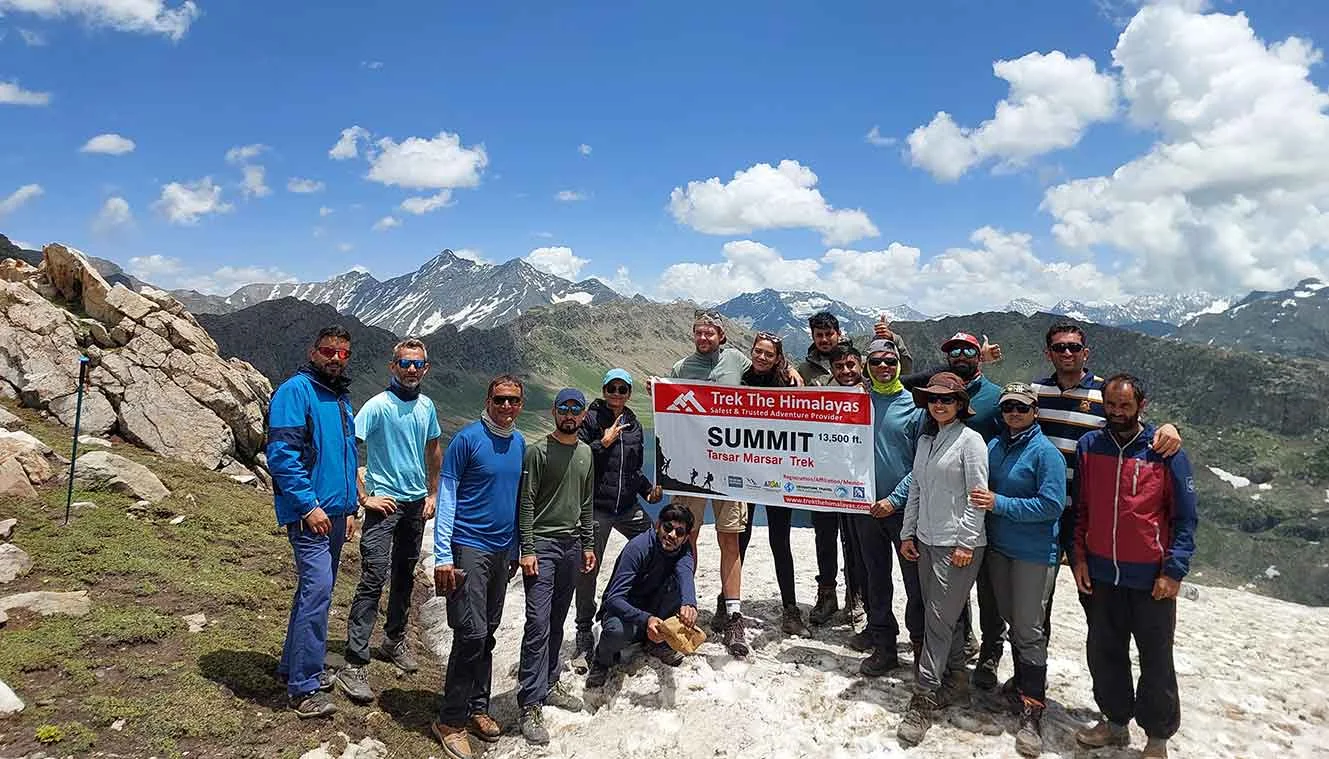
Day-1: Srinagar To Aru Base Camp
- Altitude: 2,400 m/ 7,950 ft.
- Depart Srinagar by 1 pm.
- Drive: 4 hrs | Srinagar To Aru.
- Srinagar to Pahalgam- 100 km to Aru 12 km.
- Transportation from Srinagar to Aru is included in the cost.
- Aru is on the bank of Lidder River.
- Since there are no shops around ensure that you have all you need already.
- Please note that prepaid sim cards don’t work in Kashmir.
- Pahalgam is the last point where you get a mobile network.
- Last ATM is in Pahalgam.
- Stay in tent.
- Don’t forget to carry your ID proof in original and 2 photocopies.
Day-2: Aru To Lidderwat
- Altitude: 2,800 m/ 9,150 ft.
- Trek Distance: 10 km | Duration: 6 to 7 hrs.
- Altitude Gain: 400 m/ 1,200 ft.
- Easy terrain, gradual ascent.
- Water can be refilled from streams.
- Packed lunch on the way.
- Stay in tents.
Day-3: Lidderwat To Shekwas
- Altitude: 3,350 m/ 11,000 ft.
- Trek Distance: 6 km | Duration: 5 hrs.
- Altitude Gain: 550 m/ 1,850 ft.
- Moderate terrain, continuous ascent for a few hours.
- Enough water sources on the way.
- One river crossing just before Homwas.
- Hot lunch at campsite.
- Stay in tents.
Day-4: Shekwas To Tarsar And Explore Tarsar
- Altitude: 3,800 m/ 12,500 ft.
- Trek Distance: 4 km | Duration: 3 to 4 hrs.
- Altitude Gain: 450 m/ 1,500 ft.
- Moderate terrain, continuous gradual ascent.
- Carry enough water, only a few natural sources are available.
- In the evening explore Tarsar Lake.
- Hot lunch at campsite.
- Stay in tent.
Day-5: Tarsar To Sundarsar
- Altitude: 4,000 m/ 13,100 ft.
- Trek: 6 km | Duration: 5 hrs.
- Altitude Gian: 200 m/ 600 ft.
- Moderate to difficult terrain.
- Steep ascent in the beginning till the pass, followed by a descent and then a gradual ascend till Sundarsar campsite.
- Carry enough water, only a few natural sources are available.
- Hot lunch at campsite.
- Stay in tent.
Day-6: Visit Marsar And Then Homwas
- Altitude: Marsar Ridge: 4,100 m/ 13,000 ft; Homwas: 3,500m/ 11,500 ft
- Trek Distance: 11 km | Duration: 7 hrs
- Altitude loss: 500 m/ 1,600 ft
- Moderate terrain
- 50 minutes continuous to Marsar Ridge
- Gradual descent all the way to Homwas
- Packed lunch on the way
- Stay in tent
Day-7: Homwas To Aru And Drive Srinagar
- Altitude: 2,400 m/ 7,950 ft.
- Trek Distance: 13 km trek | Duration: 6 to 7 hrs.
- Drive Distance: 112 km | Duration: 4 hrs.
- Easy terrain.
- Continuous gradual ascend till Aru.
- Many water streams are available on the way.
- Packed lunch on the way.
- Stay in Srinagar (not included in cost).
- You will reach Aru between 2-3 pm.
- You will reach Srinagar between 7-8 pm.
Please note that prepaid sim cards do not work in Kashmir.
Don’t forget your ID proof in original and 2 photocopies.
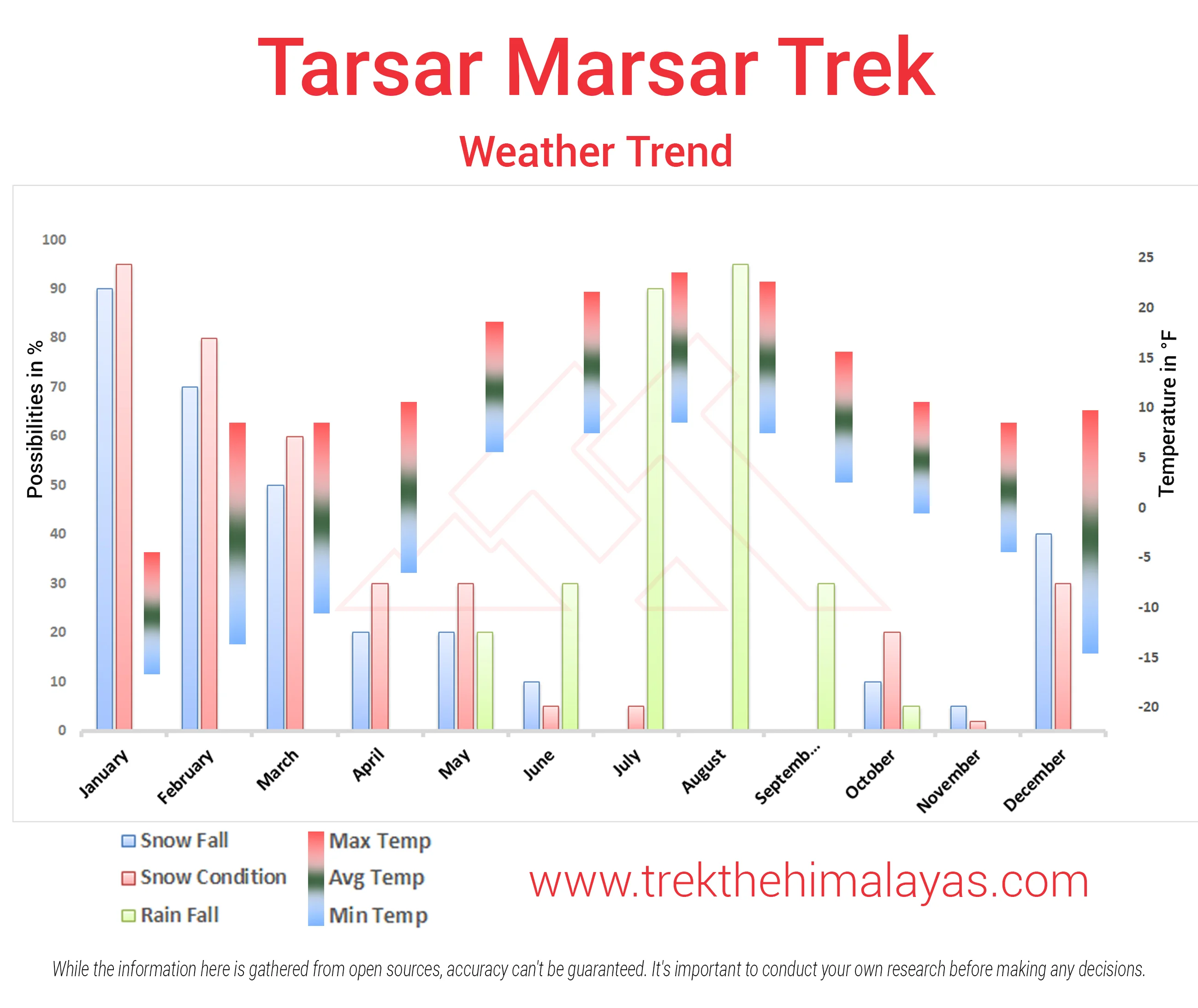
Important Links
- Mandatory Documents to Bring on A Trek Click Here.
How To Reach
It is essential for everyone to arrive at Srinagar (11:00 am)
Pick-up location: Nishant Garden to tourist reception center, rajbagh, srinagar.
Once you have reached Srinagar, TTH will manage the rest of your travel arrangements, if you have opted for TTH's pick-up service, you can select this option during the booking process by adding it as an add-on.
Do reach Srinagar one day before your trek date for a safer side.
Pick-up Place & Time : Nishant Garden to tourist reception center, rajbagh, srinagar.and pick up time is between 12:00 noon to 12:30pm
Options to Reach Srinagar:
1. If you are planning to take a bus, you can reach the bus stand in Srinagar from any major city. It will take approx. 30 minutes to reach Nishant Garden from the bus stand.
2. If you are planning to fly to Srinagar which is well connected to all major airports in India, you can reach Nishant Garden in 45 to 60 minutes via taxi from the airport (approx 20 Km).
3. If you’re coming by train, there are two railway stations.
- Jammu railway station is about 260 km away and takes around 8 hours by bus.
- Udhampur is 200 km away and from there it is a 6 hours bus journey to Srinagar.
If you prefer to travel independently, you can either take a government bus or book a private cab. Your trek coordinator will provide guidance on how to arrange for the bus or cab booking.
Arrive in Rishikesh by 6:00 pm.
The designated drop-off point is Nishant Garden.
If you have to make any arrangements for further travel from Srinagar, do it the next day.
TTH offers comfortable transportation through Tempo Traveler, Bolero, or equivalent vehicles. If you wish to upgrade your mode of transportation, please contact your trek coordinator for further assistance.
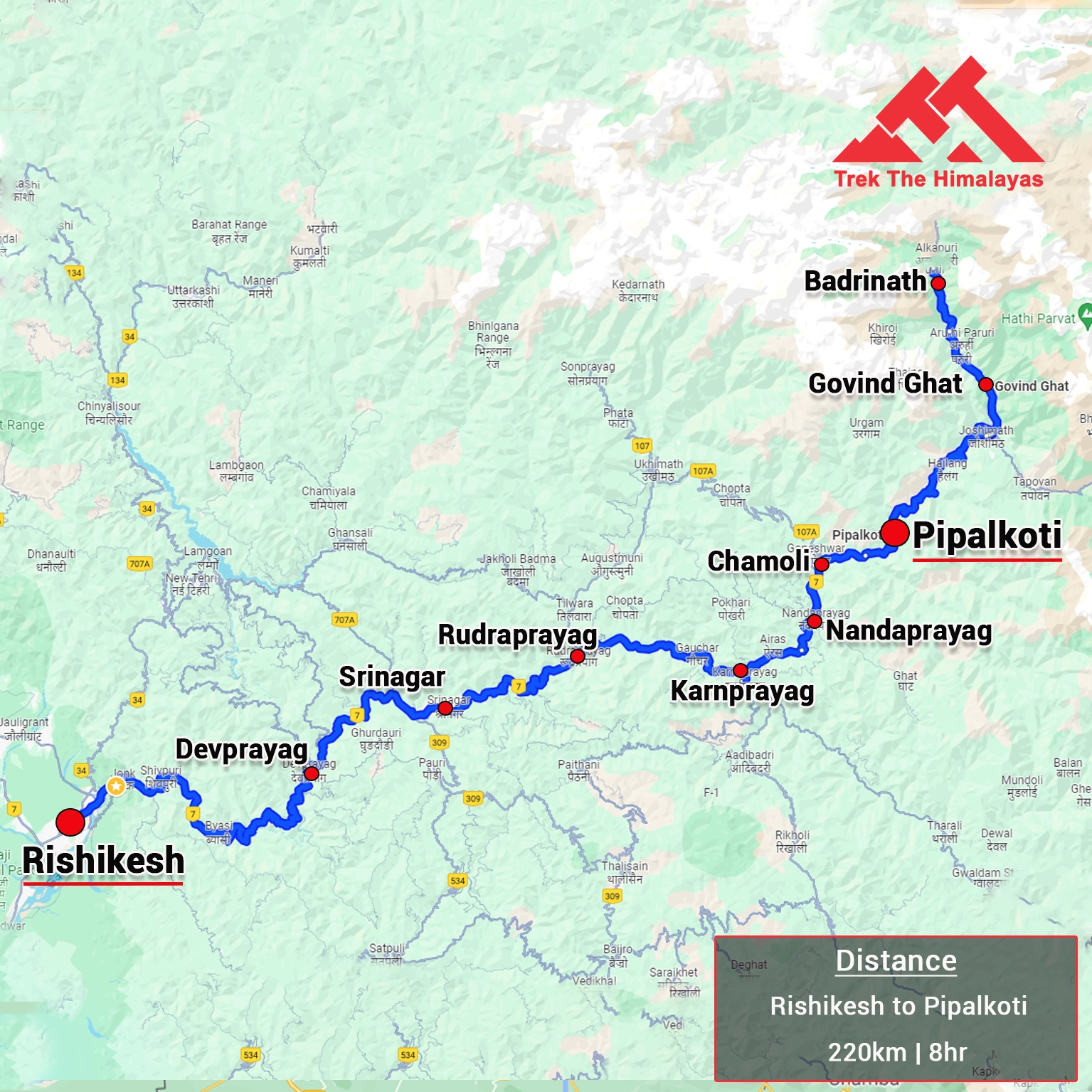
Cost Terms
Inclusion
1. Accommodation (as per the itinerary):
- Guest house (Triple sharing).
- Camping (Twin sharing basis).
2. Meals (Veg + Egg):
- Day 1 Dinner to Day 7 packed lunch as per the itinerary.
3. Support:
- 1 Versatile base camp manager: handles communication and deploys extra manpower in emergencies.
- 1 Mountaineering & First aid qualified professional trek Leader.
- 1 Experienced high altitude chef.
- Local experienced guides (Number of guides depending on the group size).
- Enough support staff.
4. Trek equipment:
- Sleeping bag, Sleeping liners (if required), Mattress, Utensils.
- 3 men all season trekker tent (twin sharing), Kitchen & Dining tent, Toilet tent.
- Camping stool, Walkie talkie.
- Ropes, Helmet, Ice axe, Harness, Gaiters & Crampon (if required).
5. First aid:
- Medical kit, Stretcher, Oxygen cylinder, Blood pressure monitor, Oximeter, Stethoscope.
6. Mules/porters to carry the central luggage.
7. Clock room facility available at the base camp for additional luggage.
8. All necessary permits and entry fees, Upto the amount charged for Indian.
9. Services from Srinagar to Srinagar.
Exclusion
1. Transportation (as per the itinerary):
- Transport from Srinagar to Aru & return : NON AC.
2. Insurance (Mandatory).
3. Food during the transit..
4. Any kind of personal expenses.
5. Mule or porter to carry personal luggage.
6. Emergency evacuation, hospitalization charge or etc.
7. Anything not specifically mentioned under the head Inclusion.
8. Hotel stay in Srinagar.
Srinagar Accommodation: The stay at Srinagar on the last day is not included in the trek fee. However we can assist you in booking a hotel or a houseboat for the same, please let us know at least 15 days in advance to the start of the trek. Intimation is by email only at info@trekthehimalayas.com
Things can be provided on demand and availability (participant has to pay extra for these things).
1- Satellite phone/set phone - is a type of mobile phone that connects via radio links via satellites orbiting the Earth instead of terrestrial cell sites like cellphones. Therefore, they can operate in most geographic locations on the Earth's surface.
2- Gamow/PAC HAPO Bag (Portable Hyperbaric Bag) - is a unique, portable hyperbaric chamber for the treatment of acute mountain sickness (AMS), also known as altitude sickness.
3- AEDs (Automated External Defibrillators) - are portable life-saving devices designed to treat people experiencing sudden cardiac arrest, a medical condition in which the heart stops beating suddenly and unexpectedly.
Cancellation terms:
Cancellations prior to 25 days from the start of the Trip
Refund options
- 5% deduction of trek fee
- 100% cash voucher for any trip till one year
- Transfer your trek (any trek, any date) to your friend
Cancellation between 24 days and 15 days to the start of the Trip
Refund options
- 30% deduction of trek fee
- 100% cash voucher for same trip till one year
- 85% cash voucher for any trip till one year
- Transfer your trek (same trek, any date) to your friend
Cancellation between 14 days and 10 days to the start of the Trip
Refund options
- 50% deduction of trek fee
- 80% cash voucher for same trip till one year
- 70% cash voucher for any trip till one year
- Book the same trek, in the same season, with any other batch
- Transfer your trek (same trek, any date) to your friend
Cancellation less than 9 days to the start of the trek
Refund options
- No cash refund
- 20% cash voucher for the same trip till one year
- 10% cash voucher for any trip till one year
- Transfer your trek (same trek, same date) to your friend
Note- If a booking is made using a voucher or discount code, the policies related to vouchers and discounts cannot be modified.
In the unlikely event that TTH cancels a trek prior to the scheduled departure date:
While it is extremely rare for TTH to cancel a trek, we understand that unforeseen circumstances or natural disasters may occasionally require us to do so before the scheduled departure. These circumstances could include continuous rain or snow, thunderstorms, snowstorms, landslides, floods, earthquakes, or any other natural calamity that poses a risk to the safety of our trekkers. Additionally, unforeseeable events such as local riots, curfews, pandemics, lockdowns, government orders, or any similar situations that compromise the safety of the trekking experience may also necessitate a cancellation.
In the event of such a cancellation, TTH will provide you with a voucher equivalent to the amount you paid for the trek. This voucher can be redeemed for any of our treks within the next year, allowing you to still enjoy an adventure with us at a later date.
Note
-
The issuance of a voucher is not applicable in situations where you are required to descend from the trek for any reason. The trek leader may make the decision to send you down from the trek due to factors such as insufficient fitness level, symptoms of Acute Mountain Sickness (AMS), high blood pressure, exceeding the designated turn-around-time, health concerns, or if you are found smoking, drinking, or violating the rules set for the trek. In such cases, the provision of a voucher does not apply.
In the rare event that TTH shifts a trek:
We would like to emphasize that weather conditions in high-altitude areas are highly unpredictable and can undergo sudden changes at any time, irrespective of the day. Additionally, circumstances beyond our control, such as natural disasters, political unrest, pandemics, and lockdowns, may impact the feasibility of conducting a trek. In cases where we are unable to proceed with an event due to such circumstances that are beyond our direct control, we will make every effort to provide you with an alternative trek that is safer and more suitable.
In such situations, we will issue a voucher to offset the cost difference between the originally scheduled trek and the alternative trek. This voucher can be redeemed at any time within one year from the date of issue. Please note that a refund fee or reimbursement of the cost difference is not applicable in these cases.
Note:
- Change of trek batch is dependent on the availability of seats in the batch
- In case of transferring a trek to a friend, he/she should satisfy all the mandatory requirements put forward by TTH
- TTH holds the right to change/cancel the policies, without prior notice
- Cash refund is applicable only in case of bookings made without using any promotional offer code or vouchers
Cash Voucher Terms:
- This is a non-transferable voucher
- The voucher cannot be merged with any other offer of Trek The Himalayas
- The voucher is valid for Trek booked directly with Trek The Himalayas in India
- To avail the voucher please use your register phone number or e-mail id
- All the other Terms of booking a trek with Trek The Himalayas are applicable to the voucher
- Trek The Himalayas holds rights to add/remove any of the Terms and Conditions without prior notice
Itineraries are based on information available at the time of planning and are subject to change. "Trek The Himalayas" reserves the right to change expedition dates, people or itineraries as conditions warrant. If a trip must be delayed or the itinerary changed due to bad weather, road conditions, transportation delays, government intervention, airline schedules, sickness, or other contingency for which TTH or its agents cannot make provision, the cost of delays and/or other changes are the responsibility of the participant. TTH reserves the right to decline, or accept, any individual as a trip member for any reason whatsoever.
Trek Essentials
PDF Of Trek Essential Download
| Backpack with rain cover | (50 - 60 ltr) with comfortable shoulder straps |
| Day pack with rain cover | 20 - 30 ltr (If off-load opted) |
| Walking stick | Advisable (At least one) |
| Water Bottle / Hydration pack | 2 bottles of one liter each, People who use hydration pack 1 hydration pack and 1 bottle of one liter. |
| Small size tiffin/lunch box | 1 Nos |
| Snacks | Energy bars, dry fruits, electoral/ors |
| Personal Medical Kit | Consult your doctor |
| T-Shirt (Synthetic quick dry) | 2 Full & 2 Half sleeves |
| Fleece T-shirt | 1 Nos |
| Wind stopper / Fleece jacket | 1 Nos |
| Windproof Jacket | 1 Nos |
| Down feather / Hollow jacket | 1 Nos |
| Thermal inner (Upper and Lower) | 1 Pair |
| Trek Pant (Synthetic quick dry) | 3 Nos |
| Wind stopper / Fleece Pant | Not required |
| Waterproof gloves | Not required |
| Fleece / woollen gloves | 1 Pair |
| Poncho / waterproof Jacket and pant | 1 Nos |
| Sunscreen | 1 Nos |
| Moisturiser | 1 Nos |
| Chap-stick / Lip balm | 1 Nos |
| Toothbrush and toothpaste | 1 Nos |
| Toilet paper & Wipes | 1 Nos |
| Soap / hand sanitizers | 1 Nos |
| Antibacterial powder | 1 Nos |
| Quick dry towel | 1 Nos |
| Head torch | 1 Nos. (Avoid Hand torch) |
| Sun Cap | Not required |
| Woolen cap | 1 Nos. |
| Balaclava | Not required |
| Buff / Neck-gaiters | 2 Synthetic |
| Sunglasses | UV with dark side cover, People who wear spectacles - (A)- Use contact lenses | (B)- Photo chromatic glasses |
| Trekking shoes | 1 Pair (Waterproof, high ankle, good grip) |
| Floaters / flip-flops | 1 Pair |
| Cotton socks | 7 pairs |
| Woollen socks | 1 pairs |
| Gaiters | 1 Pair (TTH provides when required) |
| Micro spikes | 1 Pair (TTH provides when required) |

Frequently Asked Questions(FAQ)
To register with TTH, visit our website - www.trekthehimalayas.com and create your account. To create your account you will need to use your email address and fill in all the details, set your unique password and your account is ready to use.
- To book a trek with TTH, you first need to register with us and create an account.
- Choose the trek that you want to do and click on available dates.
- You will land at the login page, fill in the required details.
- Add Participants, choose add-on services click on the Pay now button, choose your preferred payment method, and make the payment. TTH accepts multiple payment options, including credit/debit cards, net banking, and UPI.
- You will receive a confirmation email from TTH with all the necessary details about the trek, including the meeting point, transportation, accommodation, and other important instructions.
please send an email to us at info@trekthehimalayas.com or reach out to the numbers provided in the Help and Support section of your Trek Page. We will ensure that your issue is promptly resolved.
To book services such as off-load luggage and transportation, you can find them listed as add-ons. These additional services can be booked at the time of your initial booking. If you miss booking add-ons during the initial reservation, you can log in anytime and easily book 4 days before the departure date add-ons through the platform.
In such a situation, please log in to your account and transfer your trek or date to the desired one within 12 hours or drop us an email at info@trekthehimalayas.com 10 days before the departure date of the trek. After the initial 12-hour period, any changes will be processed according to the cancellation policy.
We recommend visiting our "Suggest Me a Trek" page. By filling out the form, our experts will contact you with the best possible trek options based on your preferences and experience level. Alternatively, you can reach out to us via email at info@trekthehimalayas.com or give us a call using the numbers provided on our website for personalized assistance and recommendations.
Family treks differ from regular treks by focusing on ease of difficulty, offering shorter durations for younger participants, Kid-friendly and easily digestible foods, child-friendly activities, maintaining a higher guide ratio for diverse age groups, and implementing additional safety measures for families.
Family Trek with Kids recommendation Only Dayara Bugyal and Chopta Chandrashila Trek.
Minimum age for TTH treks is typically 7 years, though this may vary depending on the specific trek.
Yes, you can take a kids to a high-altitude trek with a parent. Discuss with a trek expert before booking a trek.
Junior trekkers (below 15 years) should have a company of parents/guardians.
Trekkers between 15 to 18 years can come solo with the disclaimer form signed by parent/guardian.
Medical & Disclaimer Form (Mandatory Documents) Click here to download medical and disclaimer form
Physical Fitness: Ensure your child is physically fit. Engage them in regular exercise, outdoor activities, and hikes to build stamina and endurance. Hydration: Emphasize the importance of staying hydrated at high altitudes. Encourage your child to drink water regularly, even if they don't feel thirsty. Proper Nutrition: Provide a well-balanced diet with sufficient carbohydrates for energy and foods rich in iron to prevent altitude sickness. Adequate Sleep: Ensure your child gets enough sleep in the days leading up to the trek. Quality rest is crucial for altitude adaptation. Educate on Altitude Sickness: Teach your child about the symptoms of altitude sickness, such as headache, nausea, and dizziness. Encourage them to communicate any discomfort immediately. Appropriate Clothing and Gear: Dress your child in layers to adjust to changing temperatures. Ensure they have appropriate trekking gear, including sturdy footwear. Positive Mindset: Foster a positive mindset. Encourage your child, and let them know it's okay to take breaks when needed. Medical Check-Up: Schedule a medical check-up before the trek to ensure your child is fit for high-altitude activities. Consult with a healthcare professional about any potential health concerns.
TTH takes special care to provide wholesome and nutritious food for children on treks. Here are some of the foods that are typically served for children:
Breakfast: For breakfast, TTH serves a variety of options like porridge, cornflakes, bread, butter, jam, honey, boiled eggs, omelettes, and pancakes. Children can choose from these options to fuel themselves for the day's trek.
Lunch: For lunch, TTH serves lunch which includes rotis, vegetables, rice, dal, and salad. The rotis are usually made fresh on the trek and are a good source of carbohydrates. The dal and vegetables provide protein and other essential nutrients.
Snacks: TTH provides healthy snacks like fresh fruits, dry fruits, energy bars, cookies, and biscuits to keep the children energized throughout the day.
Dinner: For dinner, TTH serves a hot and wholesome meal which includes soup, rice, dal, vegetables, and a non-vegetarian dish (if requested in advance). Children can also choose from a variety of desserts like custard, jelly, and fruit salad.
Dietary requirements: If a child has any special dietary requirements, TTH can cater to those needs as well. For example, if a child is lactose intolerant or allergic to nuts, the kitchen staff can make arrangements to accommodate those requirements.
Choosing the right trek for a beginner can be a bit overwhelming as there are many factors to consider such as distance, elevation gain, terrain difficulty, weather, and time of year. Here are some tips that can help you choose the right trek for a beginner:
1. Determine fitness level: Assess the fitness level of the beginner to understand their physical capabilities. This will help you select a trek that is challenging but not too difficult.
2. Choose a well-traveled trail: A well-traveled trail will have more amenities such as signposts, water stations, and shelter. It is also safer as there will be other hikers on the trail.
3. Consider the length of the trek: For beginners, it is recommended to start with a shorter trek that can be completed in a day or two. This will help them get acclimatized to trekking and build their confidence.
4. Look for gradual elevation gain: Choose a trek with a gradual elevation gain rather than steep ascents. This will make the trek easier and more enjoyable.
5. Check the weather: Check the weather forecast before selecting a trek. Avoid treks during the monsoon season or winter when the trails can be slippery or dangerous.
6. Research the trail: Read about the trail to get an idea of the terrain, altitude, and difficulty level. This will help you select a trek that is suitable for the beginner.
7. Consult with an expert: If you are unsure about which trek to choose, consult our trek expert Mr. Nitin (+91 70600 59773) between 10 AM to 6 PM (Tuesday - Friday). Mr. Nitin will provide you valuable advice and guidance.
Overall, it is important to choose a trek that is enjoyable, challenging but not too difficult, and suitable for the beginner's fitness level and experience.
It is not recommended for a beginner to choose a difficult Himalayan trek. Trekking in the Himalayas can be physically and mentally challenging, especially if you are not used to the high altitude, steep slopes, and rugged terrain. Choosing a difficult trek without the proper experience, fitness level, and preparation can be dangerous and put you at risk of altitude sickness, injury, and other hazards.
If you are a beginner, it is recommended to start with an easier trek and gradually build up your skills and experience. This will help you understand the challenges of trekking in the Himalayas, and also prepare you physically and mentally for a more difficult trek in the future. It is also important to choose a trek that matches your fitness level, experience, and interest.
There is no specific age limit for a beginner trekker. However, it is important to consider your physical fitness, health condition, and personal interests before embarking on a trek. Trekking in the Himalayas can be physically and mentally demanding, and requires a certain level of physical fitness and endurance.
If you have any pre-existing medical conditions or are above a certain age, it is recommended to consult with a doctor before embarking on a trek. It is also important to listen to your body and take breaks as needed during the trek to prevent exhaustion or injury.
We recommend visiting our "Suggest Me a Trek" page. By filling out the form, our experts will contact you with the best possible trek options based on your preferences and experience level. Alternatively, you can reach out to us via email at info@trekthehimalayas.com or give us a call using the numbers provided on our website for personalized assistance and recommendations.
Yes, you can join the trek. We have fixed departure groups where you can simply book your trek and we will take care of curating a group.
Before you start the trek, it is recommended that you make all the necessary phone calls as during the trek you may or may not receive network coverage, once you come back to the Base Camp, you can reconnect with your family via phone once again. You can share your trek coordinator contact detail with your family members to get the latest updates about your trek batch.
At TTH, we provide wholesome and nutritious meals during the trek. The food is vegetarian and includes a variety of dishes such as rice, dal, vegetables, chapati, paratha, pasta, noodles, and soup. We also offer snacks such as biscuits, and salty, and dry fruits during the trek. Special dietary requirements such as vegan, gluten-free, or Jain food can also be arranged if informed in advance.
If you are allergic to some foods, you need to let us know in advance so that we can make arrangements accordingly.
TTH is a trekking company that prioritizes the safety of all its participants, including women trekkers. They have a comprehensive safety system in place, which includes a dedicated team of experienced and trained trek leaders and support staff who are equipped to handle emergency situations and provide first aid.
TTH also takes specific measures to ensure the safety and comfort of women trekkers. They have a separate tent accommodation for women trekkers, female trek leaders, and support staff. They also provide separate toilet facilities for women and encourage a safe and respectful environment for all trekkers.
Moreover, TTH has a strict policy against any kind of harassment and has a zero-tolerance policy towards such incidents. They have a designated Internal Complaints Committee (ICC) to investigate and address any complaints related to harassment or misconduct. Overall, TTH has a good reputation for safety and responsible trekking practices, and women can feel comfortable and safe while trekking with them.
In case you are the only women in the group, we provide a single sleeping arrangement. Also, during the trek, the trek leader will always remain by your side to provide optimum safety and reassurance.
You can reach out to the trek coordinator to inquire about the number of female trekkers and their respective states who have booked the trek. Please note that the trek coordinator cannot disclose personal details of any trekker. Once you've confirmed your booking, a WhatsApp Group will be created for all the trekkers in your batch. This allows you to connect with fellow trekkers before the trek begins.
While many of our treks are led by female trek leaders, however, it is not possible to know which trek leader is assigned to which group. But nonetheless, whether the trek leader is male or female you can be completely assured of your safety and security with us.
Yes, it is possible to trek with periods. However, it is important to take some extra precautions and preparations to ensure a comfortable and safe trekking experience.
Here are some tips that can help you trek during your period:
1. Use menstrual hygiene products that you are comfortable with, such as tampons, pads, or menstrual cups. It is recommended to carry enough supplies for the entire duration of the trek.
2. Pack wet wipes, hand sanitizer, and plastic bags to dispose of used hygiene products.
3. Wear comfortable and breathable clothing that allows for easy movement and reduces friction. Avoid wearing tight or restrictive clothing that can cause discomfort.
4. Carry pain relief medication, such as ibuprofen or acetaminophen, in case of menstrual cramps.
5. Stay hydrated and maintain a balanced diet to support your energy levels and overall health.
6. Take breaks as needed and listen to your body. If you feel uncomfortable or experience any unusual symptoms, seek medical attention immediately.
It is also recommended to consult with a doctor before going on a trek during your period, especially if you have a pre-existing medical condition or are taking medication. By taking necessary precautions and being prepared, you can have a safe and comfortable trekking experience even during your period.
We provide proper disposal facilities for sanitary pad disposal during the trek.
We offer three person tents with twin-sharing for optimum comfort. A woman trekker will share a tent with another woman trekker and if you are the only woman in the group, you will be given a single accommodation for your comfort and privacy.
Yes, we do provide gears on rent. You can book it using you TTH account directly.
Mountaineering qualified Experienced and first aid certified Trek Leader, First Aid Certify local guide, Cook, helpers and supporting staff.
People suffering from Bronchitis, Asthma, High blood pressure, Epilepsy (got faints), TB , Heart problem or on higher BMI side are strictly not allowed to go on any Himalayan trek. Apart from this if you had any medical history, please let us know.
No. Alcohol and smocking isn’t allowed while on trek. It is totally misconception that it will keep you warm. Your body need to acclimatize properly and for that eat properly and drink enough water; these things will keep you warm.
Toilet tents provide a convenient solution for answering nature's call in the great outdoors. Dry toilets, in particular, offer a highly sanitary approach. By digging a pit and utilizing mud and a shovel, you can easily cover up your waste. This method ensures cleanliness and hygiene while camping or exploring in the forest.
Remember to pack essential toiletries to complete your outdoor bathroom kit and maintain proper personal hygiene during your adventures. With these practices in place, you can enjoy nature while also respecting it.
Layer Up From Head To Toe
Eat Full Meals, never sleep empty stomach
You can keep warmee (if you’re more susceptible to cold).
Use sleeping bag in right way and don’t leave free space in sleeping bag.
For upper body
– Thermal layer
– T-shirt (full-sleeves)
– Fleece T-shirt (for extreme colds)
– Fleece layer
– Thick Jacket/Down Jacket
– Waterproof or Windproof layer (outermost layer, when it is snowing or raining)
- For Lower Body
– Thermal layer
– Hiking pants (normal) or Winter hiking pants
Based on how warm you feel you can skip any of the above layers. Your outer later should be windproof since it is windy at high altitude.
The idea behind layering is that the more insulation you have the less cold you feel, and instead of wearing a very thick jacket if you wear multiple layers, your body will be better insulated against the cold.
Yes, we provide micro spikes and gaiters, if required.
Mandatory documents: 2 xerox of ID having address (addhar card/driving license), 2 Passport size photographs, hard copy Medical form signed & sealed by doctor, disclaimer form sign by trekker and high altitude insurance.
No. We don’t but we can suggest you good hotel/Stay nearby pick up location.
Yes, trekker must carry 2 water bottles 1 litre each so they can refill it at campsite for drinking and keep themselves hydrate.
You should buy shoes which has these three features –Good grip, Ankle Support and additional water resistant layers. Generally, we advise Quechua Trek 100, MH 500 and MH 100.
Your return transport is also included in trek fee if you're opting for service Dehradun to Dehradun ; we use Tempo Traveller/ Tata Sumo/Max/Boloero kind of vehicle.
No one is forced to go on. There is always enough staff to split the party according to need and regroup later at the camp. Most people have no trouble reaching the highest campsite. If some members decide not to climb the final distance they can wait for the climbers to come back down the same way or take a lateral path to the descent route.
We always have a first aid kit close at hand. Serious injuries are rare. Porters will assist injured climbers to the base of the mountain and onward to a clinic or hospital. Kilimanjaro International Airport is very near Marangu Gate if evacuation to the US or Europe is advisable.
The Tarsar Marsar Trek is a mesmerizing expedition that takes adventurers deep into the heart of Kashmir's pristine wilderness. As you embark on this breathtaking journey, you find yourself immersed in a world of unparalleled natural beauty. The trail meanders through verdant meadows adorned with vibrant wildflowers, painting a picture-perfect landscape that seems straight out of a dream. Towering snow-capped peaks stand tall, their majestic presence commanding respect and awe. The crystal-clear waters of the Tarsar and Marsar lakes mirror the surrounding mountains, creating a surreal reflection that evokes a sense of tranquility and wonder. With each step, the trail unveils new vistas, from lush forests to rugged rocky terrains, offering a diverse and ever-changing backdrop that keeps your spirit engaged. As the sun sets, the sky transforms into a kaleidoscope of colors, casting a warm glow on the rugged landscape. Camping under a star-studded canopy, you are lulled to sleep by the gentle melody of nature.
Tarsar Marsar Trek is a 48 km trek.
The best time to do Tarsar Marsar Trek is during monsoon (Jul - Aug) and autumn (Sep - Mid Nov).
Tarsar Marsar Trek is an easy to moderate grade trek.
Tarsar Marsar Trek is an easy to moderate grade trek.
The maximum altitude reached during the trek is 13,500 ft.
To embark on the Tarsar Marsar Trek, you are required to obtain a few permits and permissions like the Inner Line Permit, and Wildlife Permit. When you trek with us, we obtain all the necessary permits for you.
During the Tarsar Marsar Trek, the accommodation is arranged in guesthouses in base villages and during the trek in camps (twin-sharing).
Tarsar Marsar Trek is a 7-day long trek.
Here are some of the essentials you should carry for the trek:
1. Trekking shoes: A good pair of trekking shoes is essential for a comfortable trek. Make sure your shoes are well-fitted, sturdy and provide good grip on the trail.
2. Warm Clothing: The weather can be unpredictable in the mountains, so it's important to carry warm clothing, including thermal innerwear, fleece jackets, down jacket, and waterproof jacket.
3. Trekking pants: Carry comfortable and quick-drying trekking pants that are suitable for the weather conditions.
4. Backpack: A good quality backpack with a capacity of 40-50 liters is ideal for carrying your essentials during the trek.
5. Sleeping bag: A good quality sleeping bag is essential for a comfortable stay during the camping nights.
6. Headlamp/Flashlight: Carry a good quality headlamp or flashlight with extra batteries for trekking during early morning or late evening hours.
7. Water bottle: Carry a reusable water bottle and stay hydrated throughout the trek.
8. Snacks: Carry energy bars, dry fruits, and snacks for instant energy during the trek.
9. First aid kit: Carry a basic first aid kit, including band-aids, antiseptic cream, pain relief spray, and medicines for altitude sickness.
10. Sun protection: Carry sunscreen lotion, sunglasses, and a hat to protect yourself from the harsh sun rays.
11. Trekking poles: Trekking poles can help in maintaining balance and reduce the strain on your knees while trekking.
The safety of any trekking expedition, including the Tarsar Marsar Trek, depends on various factors such as weather conditions, individual fitness levels, preparedness, and adherence to safety guidelines. While trekking in remote areas always carries inherent risks, taking necessary precautions can help mitigate potential dangers. Engaging the services of an experienced local trekking corporation can greatly enhance your safety. They possess valuable knowledge of the terrain, weather patterns, and emergency protocols, which can be invaluable during your trek.
.webp)
